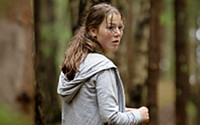| SHADOWS ON THE WALL | REVIEWS | NEWS | FESTIVAL | AWARDS | Q&A | ABOUT | TALKBACK | ||
 Shadows off the beaten path Shadows off the beaten path | ||
| Indies, foreigns, docs, revivals and shorts... | ||
|
On this page:
BURNING |
M/M SAUVAGE | UTOYA - JULY 22 < < F O R E I G N > > last update 23.Oct.18 See also: SHADOWS FILM FESTIVAL | ||
| R E V I E W B Y R I C H C L I N E | ||
Burning

| ||
|
dir Lee Chang-dong scr Oh Jung-mi, Lee Chang-dong prd Lee Chang-dong, Lee Jun-dong, Ok Gwang-hee with Yoo Ah-in, Steven Yeun, Jeon Jong-seo, Kim Soo-kyung, Choi Seung-ho, Ban Hye-ra, Cha Mi-kyung, Lee Bong-ryeon, Jang Won-hyeong, Jeon Seok-chan, Ok Ja-yeon, Soo-Jeong Lee  release Kor 17.May.18,
release Kor 17.May.18, US 26.Oct.18, UK 1.Feb.19 18/Korea 2h28 TORONTO FILM FEST 
|  It wouldn't be too difficult to cut an entire hour out of this dramatic thriller. While the meandering approach does add some realism and earthiness, plus a lot of fascinating detail, it also leaves the audience unable to piece together disparate, seemingly irrelevant elements into something coherent. Still, it's finely written, directed and played, and it's packed with superb moments.
It wouldn't be too difficult to cut an entire hour out of this dramatic thriller. While the meandering approach does add some realism and earthiness, plus a lot of fascinating detail, it also leaves the audience unable to piece together disparate, seemingly irrelevant elements into something coherent. Still, it's finely written, directed and played, and it's packed with superb moments.
When aspiring writer Jongsu (Yoo) happens to meet old classmate Haemi (Jeon), he seems like he's ready to disrupt his life for her. Agreeing to feed her cat while she visits Africa, Jongsu has also just moved back into his family home after his father (Choi) was sent to prison for assault. But things take an unexpected turn when Haemi returns from her travels with Ben (Yeun), a wealthy young guy who stirs up jealous feelings in Jongsu. So when Haemi goes missing, Jongsu begins to suspect Ben knows more than he's letting on. Director Lee lets this story float lightly across the screen, following the laconic Jongsu at his own pace. This means that quite a few sequences go nowhere at all, mainly because Jongsu is so aimless himself. There are probably important thematic reasons for an extended sequence in a church, for example, but his religious life is never referenced before or after, so it leaves us wondering. Even so, there's a driving intrigue to the plot, including some complex romantic ideas and a proper sense of mystery. Yoo is superbly hapless as Jongsu, offering a hang-dog performance as a guy who's unsure about just about everything in his life. Yet he goes about trying to make sense of it, from the tiny details of his dad's house to the larger question of Haemi's feelings toward him. Yeun is superb as the likeable stranger who simply must be hiding something nefarious. And Jeon brings a charming matter-of-fact quality to the free-spirited Haemi, who dives into everything with her heart and soul. The film's looseness is enjoyable to an extent, especially since the writers resist the temptation to explain everything in detail. Ben's weird obsession with burning down greenhouses creates a fascinating parallel quest for Jongsu, as he perhaps takes things far too literally. The point seems to be that nothing about life is as straightforward as we wish it would be. The assumption is that everyone deserves a happy ever after. But reality is far messier than that. R E A D E R R E V I E W
| |
|
15 themes, language, violence, sexuality 18.Oct.18 lff
| | |
| R E V I E W B Y R I C H C L I N E | ||
M/M

| ||
|
dir-scr Drew Lint prd Karen Harnisch, Drew Lint with Antoine Lahaie, Nicolas Maxim Endlicher, Nina Kettiger, Ahmad Larnes, Antonio Onio, Ivan Rueda, Valeria Farina, Kevin Thome de Souza, Filip Samuel Berg, Soren Drastrup, Vika Kirchenbauer, Lynn Lahaie  release US/UK 22.Oct.18 18/Germany 1h21
|  Sensual and dreamlike, this story of obsession has a remarkable attention to detail, capturing the observations and feelings of its characters. Writer-director Drew Lint establishes the story and people with largely wordless filmmaking that's evocative and intriguing, and also rather experimentally obtuse. But this encourages the actors to use their physicality to bring their roles to vivid life.
Sensual and dreamlike, this story of obsession has a remarkable attention to detail, capturing the observations and feelings of its characters. Writer-director Drew Lint establishes the story and people with largely wordless filmmaking that's evocative and intriguing, and also rather experimentally obtuse. But this encourages the actors to use their physicality to bring their roles to vivid life.
After moving to Berlin, French-Canadian 20-something lifeguard Matthew (Lahaie) spots the beautiful Matthias (Endlicher) at his pool and begins to follow him both online and around the city, but struggles to get up the nerve to speak to him. As be begins to act more and more like a stalker, Matthew gets a matching buzz cut. Then when Matthias ends up in a coma after a motorcycle accident, Matthew moves into his flat and assumes his identity. This of course leads to a confrontation, and an unexpected connection between these two men. Shot in a wash of white light and electronic sounds, the film looks terrific, as Lint works with cinematographer Ann Tipper and editor Andi Pek to draw the audience into Matthew's perspective as he yearns for both a connection and an identity. Underwater scenes are strikingly rippled fantasies, while his obsessive dreams have an unnerving realism to them. There's also a subplot in which Matthias is digitally scanned by an artist (Larnes) for an exhibition, which adds an unexpected angle to the film's physicality. Performances are of course very physical, and both actors dive fearlessly in, revealing their characters through their eyes and bodies. Endlicher's confidence is coolly echoed in Lahaie's yearning; these two men are nothing alike under the skin, other than the fact that both are driven by lust. It's never quite clear if what we're watching is real, imagined or foreshadowing, and yet it feels earthy and authentic. And there's also a bleakly humorous undercurrent that plays further on the idea of self-image and conformity. Even at this brief running time, the film sometimes feels like a short that has been extended by a number of rather random sequences (such as Matthias' various friends tending to him in the hospital). The lack of dialog adds to this impression, as characters never quite deepen beneath the surfaces and much of the film seems to consist of imagery from Matthew's fantasy life. But where the story goes is still chillingly disturbing. And there are intriguing elements throughout that add interest both in the narrative and the themes. | |
|
18 themes, language, sexuality, violence 22.Oct.18 | ||
| R E V I E W B Y R I C H C L I N E | ||
Sauvage

| ||
|
dir-scr Camille Vidal-Naquet prd Emmanuel Giraud, Marie Sonne-Jensen with Felix Maritaud, Eric Bernard, Nicolas Dibla, Philippe Ohrel, Marie Seux, Philippe Koa, Lucas Bleger, Lionel Riou, Jean-Pierre Baste, Jean-Francois-Charles Martin, Nicolas Fernandez, Nicolas Chalumeau  release Fr 29.Aug.18,
release Fr 29.Aug.18, UK Oct.18 lff, US 10.Apr.19 18/France 1h39 IRIS PRIZE FEST  THESSALONIKI FILM FEST
|  Observed in an offhanded, almost documentary style, this French drama traces the day-to-day experiences of a French prostitute who is looking for love. Filmmaker Camille Vital-Naquet takes an unflinching approach that catches details in the characters and the relationships between them. With minimalistic dialog, the film features skilful naturalistic performances from a cast of brave rising stars.
Observed in an offhanded, almost documentary style, this French drama traces the day-to-day experiences of a French prostitute who is looking for love. Filmmaker Camille Vital-Naquet takes an unflinching approach that catches details in the characters and the relationships between them. With minimalistic dialog, the film features skilful naturalistic performances from a cast of brave rising stars.
In Paris, 22-year-old Leo (Maritaud) works the park with other rentboys. But he really wants to find a boyfriend. The object of his affection is fellow prostitute Ahd (Bernard), who violently insists that he's not gay, so Leo finds little connections with his clients, including a role-playing doctor (Riou) and a soulful widower (Baste). Living on the streets smoking crack and meth can't help but affect Leo's health. And even though he befriends a transgressive escort (Dibla) and a man (Ohrel) who might actually like him, Leo simply can't get over Ahd. Vital-Naquet stages the sex scenes in unusually explicit ways that are never gratuitous: as quirky as they get, they are simply part of Leo's life, along with hanging out at parties with other aimless young people. It's rare to see a film in which sexuality isn't either celebrated or demonised, but Vital-Naquet keeps it in its place as an essential element of the characters' humanity. And this playful and honest approach makes the characters and themes almost startlingly resonant. The actors are earthy and real, finding textures of comedy and drama in unexpected places. Maritaud is brings an extraordinarily loose physicality to Leo, making him a young man who never thinks about his body, even though he's using it to get by. There's never an explanation of how he got into this life, but it feels startlingly authentic. His obsession with Ahd may seem a little absurd, but it never feels forced. And while his physical decline signals a plot point, the film is more about his internal journey. There are some cautionary moments along the way, such as johns who refuse to pay or the sinister client (Martin) lurking in the background who clearly will feature later. But Vital-Naquet grounds the film's earthy approach in the characters and events. When a doctor (Seux) offers to get him into rehab, he sees no need to change. But he replies to her compassion with an embrace. It's refreshing to see a film that understands the need for, and doesn't shy away from, a range of physical connections all of us are seeking. | |
|
18 themes, language, sexuality, violence 21.Oct.18
| | |
| R E V I E W B Y R I C H C L I N E | ||
Utøya – July 22
 Utøya 22. Juli Utøya 22. Juli
| ||
|
dir Erik Poppe prd Finn Gjerdrum, Stein B Kvae scr Siv Rajendram Eliassen, Anna Bache-Wiig with Andrea Berntzen, Aleksander Holmen, Solveig Koloen Birkeland, Brede Fristad, Elli Rhiannon Muller Osborne, Jenny Svennevig, Ingeborg Enes Kjevik, Sorosh Sadat, Ada Otilde Eide, Mariann Gjerdsbakk, Daniel Sang Tran, Magnus Moen  release Nor 9.Mar.18,
release Nor 9.Mar.18, UK 26.Oct.18 18/Norway 1h37 
|  This film explores the events of 22 July 2011 in Norway. After CCTV footage of the Oslo car bomb, filmmaker Eric Poppe traces the right-wing extremist's subsequent attack on a summer camp outside the city. Shot as a single take matching the 72-minute attack, events unfold in real time through the eyes of the (fictionalised) young people. It's a harrowing film that vividly puts the audience into an unthinkable situation.
This film explores the events of 22 July 2011 in Norway. After CCTV footage of the Oslo car bomb, filmmaker Eric Poppe traces the right-wing extremist's subsequent attack on a summer camp outside the city. Shot as a single take matching the 72-minute attack, events unfold in real time through the eyes of the (fictionalised) young people. It's a harrowing film that vividly puts the audience into an unthinkable situation.
On the tiny island of Utoya, teen Kaja (Berntzen) is camping with several hundred young people. They've heard about the bombing, and after checking that families and friends are OK they begin to get on with their day. Then panic breaks out as the steady sound of gunfire begins. As she cowers in a building, Kaja is worried that her sister Emilie (Osbourne) is still in the tent. When the gunman enters the block, the teens flee into the woods, calling for help and trying to assist each other in any way they can. The dialog has a natural, improvised feel. The kids naturally assume the bomber is an Islamic terrorist, and when chaos breaks out around them, their fear is uncomfortably vivid: they have no idea what's happening. In putting the audience into this relentless situation, Poppe never lets up on the horror. Thankfully, he also never sensationalises the situation, never depicting the killer or the violence in any detail. The details are depicted carefully, as these teens try to work out what's going on and call for help. Because the killer was wearing a police uniform, they have an extra layer of hopelessness. And the island is too small to hide on. The young actors create vivid characters with distinct personalities, each with his or her own fears and preoccupations. Berntzen is particularly strong as a young woman worried about her sister. Her phone call with her mother is particularly intense. Aside from honouring the 77 people killed that day, this important film brings a human angle to this and other events that have become almost mythical. It's important to remember that these were real people reacting in imperfect ways in an impossible situation. There is constant gunfire in the background throughout this film, which is almost overpoweringly unnerving. And Poppe's documentary approach, sticking close to Kaja throughout the ordeal, makes sure we understand how it felt. | |
|
15 themes, language, violence 21.Oct.18 lff | ||


See also: SHADOWS FILM FESTIVAL © 2018 by Rich Cline, Shadows
on the Wall
| ||
 The directing/casting/acting for this film were superb. I didn't mind the length at all, because for me every scene was imbued with suspense. I simply could not predict what would happen next, ever, yet everything that did happen was "earned" as one says of excellent writing. I do think a major theme, though subtle, can be found in Lee's appreciation for how vulnerable women are, to all sorts of manipulation. One minor character actually says, "Have you heard the saying: There's no country for women?" Lee's earlier films are also especially sympathetic toward women. Though Burning ends ambiguously, I think the lead character, hapless though he may be, has integrity, good instincts, compassion beneath the numbness that baffles him, and deductive skills, all of which he acts upon. Might he end up emotionally broken? Yes. That's a risk sentient beings face. (9.May.19)
The directing/casting/acting for this film were superb. I didn't mind the length at all, because for me every scene was imbued with suspense. I simply could not predict what would happen next, ever, yet everything that did happen was "earned" as one says of excellent writing. I do think a major theme, though subtle, can be found in Lee's appreciation for how vulnerable women are, to all sorts of manipulation. One minor character actually says, "Have you heard the saying: There's no country for women?" Lee's earlier films are also especially sympathetic toward women. Though Burning ends ambiguously, I think the lead character, hapless though he may be, has integrity, good instincts, compassion beneath the numbness that baffles him, and deductive skills, all of which he acts upon. Might he end up emotionally broken? Yes. That's a risk sentient beings face. (9.May.19)